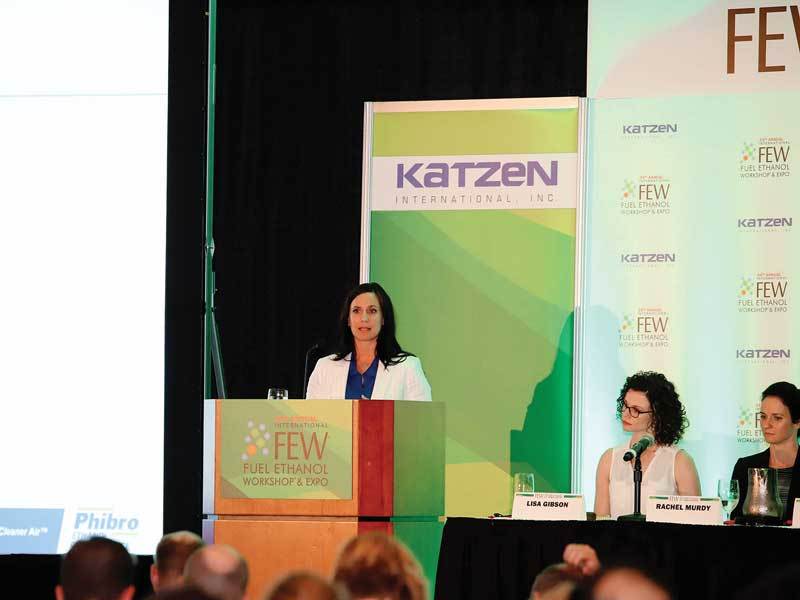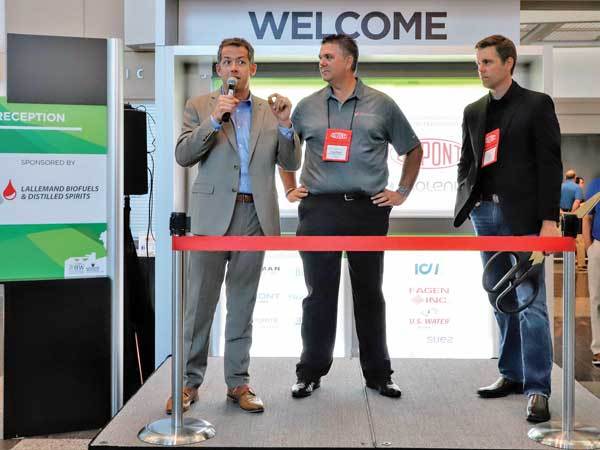FEW Technical Sessions Planner








April 15, 2019
BY Ethanol Producer Magazine
A new track emerged in the planning of this year’s International Fuel Ethanol Workshop & Expo. Track 4: Cleaning and Plant Maintenance showed its relevance in the number of abstracts submitted under its umbrella.
“I have to credit the service and technology providers for the abundance of quality content that made the creation of our Cleaning and Plant Maintenance track a reality,” says Tim Portz, conference planner for BBI International. “When we looked at the abstracts we received, it quickly became clear that the subject needed a full track. We’re thrilled to have this content on the agenda, enriching the FEW experience for the cleaning and maintenance professionals across the ethanol industry.”
This year’s event, featuring 150 speakers, is June 10-12 at the Indiana Convention Center in Indianapolis. The event kicks off June 10 with its traditional Ethanol 101 pre-conference seminar, featuring presentations about the ethanol industry, the production process, the industry’s employees, revenues and costs, and much more. Ethanol 101 is a thorough primer for those new to the industry.
The main event begins at 8:30 a.m. June 11 with a general session that will feature a keynote address, recognition of plants and people receiving Ethanol Producer Magazine’s industry awards, and a discussion panel that will cover a plethora of important topics. Five concurrent tracks run that afternoon and all day June 12. Again, the Advanced Biofuels Conference is rolled in, under Track 5.
The conference wraps up June 13 with its well-known industry tour, this year at Poet Biorefining in Alexandria, Indiana.
The 2019 FEW is expected to draw nearly 2,200 attendees, including ethanol producers, industry suppliers, service providers and researchers from around the world. “The expo hall is filling in with companies energized to discuss new technologies and services advancing the ethanol industry,” says John Nelson, director of marketing for BBI International. “Last year, the expo hall was buzzing with 560 biofuels producers in attendance, and we are expecting to reach the same number of producers this year.”
“Our goal has always been to build a conference agenda that delivered valuable content to as many members of an ethanol plant team as we possibly could,” Portz says. “This year’s agenda is certainly a sterling example of that. We’ve got presentations on yeast health happening down the hall from great discussions on recruiting and retention. The diversity of presentations this year is just terrific.”
TUESDAY, JUNE 11
1:30 – 3:00
TRACK 1: PRODUCTION AND OPERATIONS
Distilling Available Laboratory Data to Improve Production Decision-Making Processes
In so many ways, plant laboratories are the eyes and ears of what is happening within an ethanol plant. The industry’s most successful plant teams have learned that the best use of lab assets may well be to guide new production-approach concepts. Presentations in this panel will highlight the latest advancements in using labs to cost-effectively predict the outcome of small and large changes in a facility’s production approach, putting plant labs at the front of the decision-making process for the facilities they serve.
TRACK 2: LEADERSHIP AND FINANCIAL MANAGEMENT
Management Strategies to Build the Skills You Need Within the Team You Already Have
Operating a state-of-the-art ethanol production plant requires a sharp management team leading a nimble and capable production team. Finding and keeping a skilled team is tantamount to succeed and keep pace with an increasingly innovative industry. This panel will help producers think about how they can leverage this innovative spirit to inspire a desire for continuous improvement via high-quality training throughout their production team. These presentations will take it one step further by highlighting how a forward-looking training environment might be the best retention strategy.
TRACK 3: COPRODUCTS AND PRODUCT DIVERSIFICATION
Liberating Valuable Corn Oil from Plant Stillage Streams
While corn oil capture is largely ubiquitous across the industry’s production fleet, variability still exists in the percentage of available oil each plant captures. This panel will look closely at this variability, the likely reasons for the disparity within the industry and the leading strategies to help producers increase their own rates of capture. Anchored by a presentation that promises to illuminate the key performance indicators of successful oil capture, attendees will walk away from this session armed with a punch list of options to increase their own corn oil revenues.
TRACK 4: CLEANING AND PLANT MAINTENANCE
Stillage Evaporation Approaches that Reduce Overall Evaporator Load and Improve Plant Efficiency
Keeping plant evaporators clear of organic and inorganic fouling is a crucial maintenance step that costs producers significant time and money. Not surprisingly, this has catalyzed innovation aimed at reducing the frequency of evaporator cleaning and its overall cost. Featured in this panel are a variety of approaches including the use of chemical treatments to reduce mineralized deposits, centrifuges to reduce the total solids in stillage before it hits the evaporators, and the use of robotic cleaning.
TRACK 5: ADVANCED BIOFUELS CONFERENCE
Reviewing the Technologies that have Cast Corn Fiber in a Starring Role in Ethanol’s Next Chapter
Perhaps the most exciting aspect of corn fiber-to-ethanol technologies is how well the prospect of this cellulosic pathway interconnects with the industry’s broader corn fractionation ambitions. That producers must continue to find ways to isolate and add greater value to each component of inbound corn is clear, and the time for widespread fiber capture and conversion to cellulosic ethanol is now. This panel features technology updates from the front-runners in the race to bring online and rapidly expand the sector’s fiber-to-ethanol output.
3:30 – 5:00
TRACK 1: PRODUCTION AND OPERATIONS
Deploying Best Practices in Instrument Calibration to Guarantee Accurate and Reliable Lab Data
A lab’s ability to give production teams the confidence to heed the results of the trials performed within it correlate tightly with the team’s confidence in the accuracy of its instruments. Presenters in this session will walk attendees through the critical process of confirming their instruments are correctly calibrated, bolstering the team’s confidence in the conclusions they illuminate. Time will be spent discussing pH probes, solids analyzers and density meters, HPLC, NIR and level indicators.
TRACK 2: LEADERSHIP AND FINANCIAL MANAGEMENT
Ensuring Fuel Quality Specifications Align with the Industry’s Domestic and International Market Growth Ambitions
Advertisement
The emergence of more and more foreign ethanol customers only adds layers to an already-complex fuel regulation and certification environment for the industry and its producers. This panel provides a nice mix of discussions on specific topics like sulfate measurement, along with broader questions like a roundup of the growing list of certification and standards organizations ethanol producers need to be up to speed on. A talk about the EPA’s fuel streamlining effort and how it impacts ethanol producers rounds out a content-packed fuel standards session.
TRACK 3: COPRODUCTS AND PRODUCT DIVERSIFICATION
Positioning Your Plant Now to Maximize the Coming Opportunities in Low Carbon Fuel Markets and Carbon Sequestration
While initially met with skepticism and concern, low carbon fuel standards like California’s are now regarded by many producers as an opportunity to differentiate an otherwise commodified fuel product. These programs and the rewards they offer producers who have successfully driven down the carbon intensity of their fuels do not come without compliance requirements. This panel will help producers better understand the validation and verification steps they’ll have to complete in 2020 and 2021, the verifiers they can engage to prepare and the momentum in other markets to adopt similar LCFS programs.
TRACK 4: CLEANING AND PLANT MAINTENANCE
Understanding the Interplay Between Overall Plant Hygiene, Production Uptime and Reduced Infection Control Expense
Those producers who commit to a dogged pursuit of incredibly high standards for plant cleaning and overall plant hygiene do so in the hopes of saving time and money by limiting the occurrence of bacterial infection within their plant. The talks in this panel explore the plant cleaning and products available to producers in great detail, while also attempting to quantify their potential in a language all members of a plant production team can appreciate: reduced operational costs and increased overall yield.
TRACK 5: ADVANCED BIOFUELS CONFERENCE
Surveying the Innovations in Enzyme Development Paving the Way for More Widespread Advanced and Cellulosic Ethanol Production
In many ways, the cellulosic ethanol industry can advance only as fast as the development of the enzymes that will unlock the tightly bound lignocellulose and make it available to a waiting yeast population. This panel will allow attendees to catch up on the progress being made within some of the industry’s leading enzyme developments that will catapult ethanol production from cellulose streams into widespread commercial deployment. Attendees will walk away with a clear picture of how far enzymes have come and the pace of their ongoing refinement.
WEDNESDAY, JUNE 12
8:30 – 10:00
TRACK 1: PRODUCTION AND OPERATIONS
Reviewing the Continuing Effort to Develop Yeast Strains Capable of Increasing Plant Efficiency and Overall Yield
The economic rewards for even modest yield gains from improved yeasts has catalyzed the continuous work in strains optimized for ethanol production. This panel features presentations on a wide variety of strain traits including those that are enzyme expressing or are more tolerant of higher temperatures, pH or organic acid concentrations. The industry’s tight margin environment mandates that plant teams stay informed on the latest advancements in yeast strains and are prepared to capture those opportunities when they become available in the marketplace.
TRACK 1: PRODUCTION AND OPERATIONS
Managing Plant Energy Requirements with Decreased Overall Carbon Intensities Top of Mind
By itself, California’s commitment to a Low Carbon Fuel Standard put driving down the carbon intensity on the radar of many plant management teams. The continued momentum for low-carbon fuel markets in neighboring Oregon and British Columbia has only accelerated this interest. Savvy management teams know that reimaging plant energy requirements is an obvious place to begin. Presentations in this panel will get producers thinking about their power and heat requirements and the carbon-reduced options commercially available to meet them now.
TRACK 2: LEADERSHIP AND FINANCIAL MANAGEMENT
Building a Plant Culture that Will Attract and Retain the Top Talent Available in Your Labor Market
The importance of a motivated team to an organization is so well-agreed upon that it has become cliché. Nevertheless, developing and maintaining an energized and positive work environment vexes many management teams. The presenters in this panel assert the key to avoiding the production-sapping impact of low motivation and employee turnover is to build a team that feels empowered to make critical decisions, inspired by managers who trust in their abilities and are allowed to share in the plant’s overall success.
TRACK 4: CLEANING AND PLANT MAINTENANCE
Taming the Two-Headed Monster: Deploying Best-in-Class CIP Strategies to Eliminate Organic and Inorganic Fouling Deposits
Clean-in-place approaches are widespread throughout the industry to control the buildup of organic and inorganic deposits throughout the production environment and inhibit bacterial outbreaks. This panel makes it clear that while the practice is widespread, there is plenty to indicate that the industry isn’t satisfied that the process has been perfected. Populated by talks that look closely at the alternative approaches that have shown early promise, the discussion promises to give maintenance teams some new CIP approaches to consider.
TRACK 5: ADVANCED BIOFUELS CONFERENCE
The Technologies Achieving Commercial Scale Today that Will Deliver the Biofuels and Biochemicals of Tomorrow
Taken together, the presentations that populate this panel articulate just how widely the advanced biofuels industry is casting its gaze with regard to feedstocks and conversion approaches. The panel kicks off with a look at glucose production at existing ethanol plants, but then leaves the established corn conversion complex behind to look at the cellulosic components of feedstocks like municipal solid waste (MSW) and the lignin fractions found in abundance within the world’s pulp, paper and forest products sector.
10:30 – Noon
TRACK 1: PRODUCTION AND OPERATIONS
Deploying Cutting-Edge Yeast Health Strategies to Maximize Plant Fermentations
Cultivating the perfect conditions inside of plant fermenters to maximize yeast propagation is a perpetual goal for ethanol plant teams, but one that comes with some expense. Periods of tight profit margins often drive plants to scrutinize the necessity of all expenditures, including those tied to increasing yield. The presentations in this panel will look to answer the hard questions about the cost benefits of antimicrobial inputs, process water cooling, yeast nutrients and added air into propagation. This panel promises an unvarnished look at the relative return on investment for the industry’s leading yeast health and fermentation enhancement strategies.
TRACK 1: PRODUCTION AND OPERATIONS
The Options Available to Ethanol Producers for Bacterial Control and Strategies to Ensure Their Efficient Use
Bacterial infection is inevitable in ethanol production but peppered throughout the presentations in this panel are warnings of the risk to plant yields that comes along with passive acceptance of this reality. Instead, the presentations in this panel will remind producers of the financial cost of even those infections producers might regard as routine or expected. The panel also makes room for presentations on both the responsible use of available antibiotics and the alternative treatment option afforded by hop cones.
TRACK 2: LEADERSHIP AND FINANCIAL MANAGEMENT
How to Make Informed Decisions About New Technology Deployments and Ensure They Deliver on Their Promised Values
Advertisement
This discussion will begin with a presentation that gives plant leadership teams a framework for making more of strategic planning meetings and retreats. The discussion then pivots and looks more specifically at the tools available to plant management teams to make decisions about new technology deployments and the oversight approaches that guarantee they get built on time and within budget. Teams that have felt paralyzed by capital investment at their facility will appreciate this multi-disciplined look at the best practices in strategizing, deciding and ultimately seeing a project through to commissioning.
TRACK 3: COPRODUCTS AND PRODUCT DIVERSIFICATION
Practical Approaches for Deriving Maximum Value from Plant Distillers Grains Streams
Coproduct revenues have often meant the difference between black or red ink on plant profit-and-loss statements. Their importance to producers cannot be overstated and it should come as no surprise that producers are eager to derive even more value from coproduct streams, including distillers grains. Attention will be given in this panel to the continuing efforts to innovate pathways that allow producers to diversify into higher-value feed products, including high purity protein. The panel will also feature an exhaustive study conducted on the lack of antimicrobial residues in distillers grains taken from a broad swath of the ethanol fleet.
TRACK 4: CLEANING AND MAINTENANCE
Strategies for Making Your Plant Maintenance Program Both Predictive and Proactive
Performing maintenance on a predictable schedule is certainly preferable to managing through an unplanned maintenance event and unscheduled downtime. This panel is loaded with presentations that make this desired plant maintenance state more tangible and achievable for plant maintenance teams. The discussion begins with the economic argument for a predictive maintenance program, moves into a presentation about best practices in plant shutdowns and concludes with a look at harnessing the power of artificial intelligence to gain greater visibility into tomorrow’s maintenance needs.
1:30 – 3:00
TRACK 1: PRODUCTION AND OPERATIONS
Creating the Optimal Environment in Plant Fermentation Tanks to Maximize Ethanol Yield
While plant professionals understand stressed yeast populations curtail overall ethanol yield, operational discipline is required to establish and maintain the optimal fermentation environment. This panel will begin with a look at the use of a common shake flask and the new tools available to help producers leverage this simple piece of equipment for a better look at what is happening in their fermentation tanks. The discussion then moves on to quickly identifying when and why a fermenter may be in a stressed condition and concludes with a presentation on the best practices in nitrogen supplementation.
TRACK 1: PRODUCTION AND OPERATIONS
Eyes and Ears: Innovative Approaches to Data Management and Its Use in Real-Time Plant Control
The challenge for producers has now moved well beyond capturing crucial operational and financial data to making sense of it all and using it effectively to guide their decision-making process. The first presentation will look at the value of configuring financial data in new ways so human minds can see new things within it. The discussion then turns to a review of the tools available to plant teams to capture and analyze the sea of operational data that is so vast it can’t be considered without the aid of well-designed process control systems.
TRACK 1: PRODUCTION AND OPERATIONS
Minding Your Stack: Keep Plant Emissions in Tight Alignment with Air Permits
Plant professionals charged with keeping their plants in compliance with their permitted emissions limits will appreciate this panel’s two-pronged look at both monitoring and control. The discussion opens with a presentation that will help operators make sense of the testing options available to them and when to deploy each. The discussion will then move on to the leading technologies in volatile organic compound (VOC) capture and destruction before concluding with a presentation on a plant confronted with an underperforming dust collection system that led to the development of a custom filter bag that shows great potential.
TRACK 3: COPRODUCTS AND PRODUCT DIVERSIFICATION
Catching Up with Fractionation Technologies that Aim to Simultaneously Diversify Plant Revenue Streams and Increase the Captured Value of Inbound Corn
Producers have long known that they were delivering non-fermentable components of inbound corn into their fermenters. These components were captured later downstream, and the inefficiencies were tolerated in the process. Still, the concept of refining inbound corn in such a way that only the starch fraction was targeted for fermentation continues to hold great intrigue and promise. This panel features a presentation on the commercial scale deployment of a dry-fractionation approach as well as a biological approach to adding value to coproduct streams.
TRACK 4: CLEANING AND PLANT MAINTENANCE
Your Plant’s Beating Heart: The Critical Importance of Staying Abreast of Innovation in Pump Technologies
Ethanol plants move millions of gallons of flowable material through their process each year, relying on dozens of pumps deployed throughout the plant to do the work. The vital nature of the function they perform paired with the conditions into which they are typically deployed requires maintenance teams to systematically anticipate and plan for their refurbishment or replacement. Presenters in this panel will go beyond the normal fare of pump maintenance programs and urge attendees to see pumps as a promising pathway to increasing overall plant efficiency while reducing key input expenses.
3:30 – 5:00
TRACK 1: PRODUCTION AND OPERATIONS
Assessing the Continuing Innovations Available to Producers for Ethanol and Coproduct Dewatering
This panel will outline the growing list of options available to producers to remove water from their process at two important waypoints: after distillation and from distillers grains streams. Dehydration is a process bottleneck that has inspired its fair share of innovation and process rethinking. This panel allows producers to perform a side-by-side analysis of molecular sieves, emerging membrane technologies and centrifuges and determine whether their own facility is due for an improved, more efficient dehydration approach.
TRACK 1: PRODUCTION AND OPERATIONS
Instrument Flying for Ethanol Producers: Utilizing Analytical Tools to Determine the Efficacy of New Production Approaches
Conducting effective and informative plant trials is vital to any plant team hoping to leverage the industry’s incredible innovation for increased profitability at their plant. The presentations in this panel make it clear that producers have a deep toolbox to assist them in conducting effective trials more efficiently and more rapidly. Presenters will offer discussions about new spectrometers designed specifically with ethanol plants in mind, new thinking in analytical approaches, and conclude with a presentation on the potential for predictive modeling software.
TRACK 2: LEADERSHIP AND FINANCIAL MANAGEMENT
Reviewing Industry Plant Margins and the Options Available to Improve the Profitability of Your Facility
In an ethanol market awash in stories of lesser, not greater, ethanol use and tight margins, plant teams are hungry to know where their plant stands regarding profitability and the pathways to higher returns from their operation. This discussion offers both. The discussion will begin with a data-rich presentation about the profitability the leaders and laggards of the industry are achieving, informed by the industry’s largest benchmarking effort. The discussion will then look at using risk management strategies to lock in future margins, and finish with a discussion about the importance of asking hard questions about the realistic chances of margin improvements promised by new production approaches and technology deployments.
TRACK 4: CLEANING AND PLANT MAINTENANCE
Mechanical and Biological Considerations for Ensuring Plant Cooling Towers are Operating at Peak Efficiency
The ability to create optimal fermentation at ethanol production facilities year-round hinges on the production team’s ability to operate plant cooling towers at great efficiency, especially during the hot and humid dog days of summer. The options available are well understood—new pumps, increased chiller capacity or the addition of new cells or new towers altogether. This discussion dives into the fundamentals of cooling tower operation with the hopes that attendees will walk away better armed to make the right decisions regarding their cooling infrastructure and program moving forward.
TRACK 5: ADVANCED BIOFUELS CONFERENCE
The First Advanced Biofuel: An Update on Biodiesel Production, Use and Its Likely Market Trajectory
In many ways, biodiesel and ethanol have a shared history. Both biofuels were developed to add value to a row crop whose downstream markets weren’t delivering the kinds of returns their growers needed. Both industries owe their initial build-out and rapid early growth to the Renewable Fuel Standard and both are now trying to break out of the confines of their first-generation production approaches and blending rates. This panel offers the audience the program’s best opportunity to catch up not only with the policy status of the biodiesel industry but also the developmental progress of pathways that will deliver the industry’s next gallons.
Related Stories
U.S. fuel ethanol capacity fell slightly in April, while biodiesel and renewable diesel capacity held steady, according to data released by the U.S. EIA on June 30. Feedstock consumption was down when compared to the previous month.
XCF Global Inc. on July 8 provided a production update on its flagship New Rise Reno facility, underscoring that the plant has successfully produced SAF, renewable diesel, and renewable naphtha during its initial ramp-up.
The U.S. EPA on July 8 hosted virtual public hearing to gather input on the agency’s recently released proposed rule to set 2026 and 2027 RFS RVOs. Members of the biofuel industry were among those to offer testimony during the event.
The U.S. exported 31,160.5 metric tons of biodiesel and biodiesel blends of B30 and greater in May, according to data released by the USDA Foreign Agricultural Service on July 3. Biodiesel imports were 2,226.2 metric tons for the month.
The USDA’s Risk Management Agency is implementing multiple changes to the Camelina pilot insurance program for the 2026 and succeeding crop years. The changes will expand coverage options and provide greater flexibility for producers.
Upcoming Events










